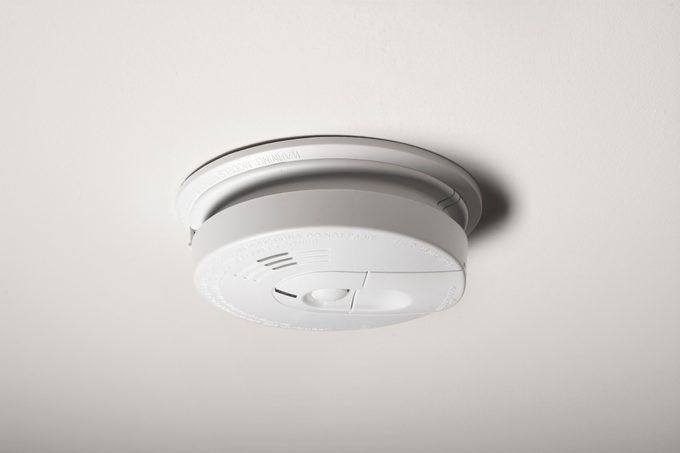Hardwired vs Battery Smoke Detector: Important Differences
Updated: Mar. 18, 2024

Hardwired smoke detectors are an important safety upgrade to your home.
Our editors and experts handpick every product we feature. We may earn a commission from your purchases.Learn more.
Sponsored by Home Depot: This piece was created in partnership with Home Depot, home to Kidde fire safety products that can help you protect your home and family with fire alarms, carbon monoxide alarms and fire extinguishers.
Having working and dependable smoke alarms is home safety 101. Whether you’re concerned about common household items that can spark a fire, environmental risks like wildfires, or just simply protecting your loved ones, ensuring you have the best possible smoke alarms is incredibly important.
Installing UL-certified smoke alarms in your home is one of the vital fire safety tips you need to know, and just may save lives. But shopping for the right one can be overwhelming. We spoke to a fire safety expert and weighed the pros and cons of cost, reliability and installation of hardwired smoke alarms versus battery-operated. Here’s everything you need to know.
On This Page
Hardwired smoke detector vs. battery-operated
One of the biggest decisions when choosing a smoke detector is whether to opt for a hardwired or battery-operated model. Both have their advantages.
“Having a hardwired smoke alarm helps to increase the chance alarms have power and are ready to signal in case of a fire,” says Sharon Cooksey, the fire safety educator for Kidde. “In fact, three out of five home fires come from homes without working smoke alarms that are missing batteries.”
Winner: Hardwired smoke alarm is our choice for better safety, especially for those who tend to be forgetful about replacing batteries.
Installing hardwired smoke detector vs. battery-operated
This one boils down to how comfortable you are with electrical wiring. Hardwiring a new fire alarm system isn’t a DIY job; you’ll need to call an electrician.
Replacing an existing hardwired alarm can be relatively easy for mildly handy types. For those who prefer the easiest possible installation with the least amount of know-how, a battery-operated smoke alarm may be best. Be sure to install hardwired alarms in any room with exposed lightbulbs, one of the most overlooked fire hazards at home.
An economical and simple-to-install model like the Kidde Firex Smoke Detector offers easy operation and a front-loading battery door. It’s a breeze for almost anyone to maintain. Just replace the batteries when needed.
Winner: This one could go either way and really depends on your comfort level. Hardwired options provide better safety protection. Battery-operated smoke alarms, on the other hand, require the least amount of technical skills.
Costs
Whether you’re choosing a hardwired smoke detector or a battery-operated unit, Cooksey says you’ll find plenty of affordable options. “They’re both typically offered at similar price points,” she says. You should also look at how to prevent home fires in the first place.
Winner: A tie. This one boils down to preference and willingness to install.
How long do hardwired smoke alarms last?
If you’re aiming for the longest dependable smoke alarm coverage, hardwired alarms can easily offer 10 years of protection, in fact every alarm must be replaced every 10 years.
“Most fire codes require hardwired alarms,” Cooksey says. “There is a move to a hardwired smoke alarm with a built-in 10-year battery that lasts the life of the alarm and doesn’t require battery changes. Most fire experts just want working smoke alarms, but hardwired is a great choice in spaces that have wiring. If not, we strongly recommend a battery-only with a built-in 10-year battery.”
An option like this Kidde 10-Year Worry-Free Hardwired Smoke Detector offers long-lasting protection, plus a voice alarm and ambient light ring.
Winner: Hardwired smoke alarm systems win this round, hands down. If your space doesn’t easily allow for hardwiring, a battery-operated smoke alarm may be a suitable option. Many battery-operated alarms offer 10-year batteries like this Kidde 10-Year Worry-Free Sealed Battery Smoke Detector with wireless voice interconnect.

Dependability
“Hardwired alarms are connected to a power supply ensuring the constant power needed for a working smoke alarm,” says Cooksey. “Working smoke alarms double the chance of escape from a home fire, so having the constant power supply helps. We caution that every alarm — hardwired, battery-only, or both — needs to be replaced at least every 10 years.”
Winner: Hardwired smoke alarms seem to be the clear winner here, but there’s value in battery-operated alarms as well. Choose hardwired alarms for areas with easy electrical wiring access, and battery-operated for trickier areas with less accessible wiring.
Safety
Any working smoke alarm is better than none, so you’re headed in the right direction with either type. Cooksey stresses hardwired smoke detector units are often better in the long haul because you’ll most likely have power in the case of a fire or natural disaster. Hardwiring is also great for forgetful types who may not remember to routinely check and replace batteries.
Cooksey’s favorite smoke alarm models incorporate hardwiring and batteries into their design. This combination creates a nearly foolproof way of ensuring one system is always working.
Winner: Hardwired with 10-year backup battery operation wins this round.



















